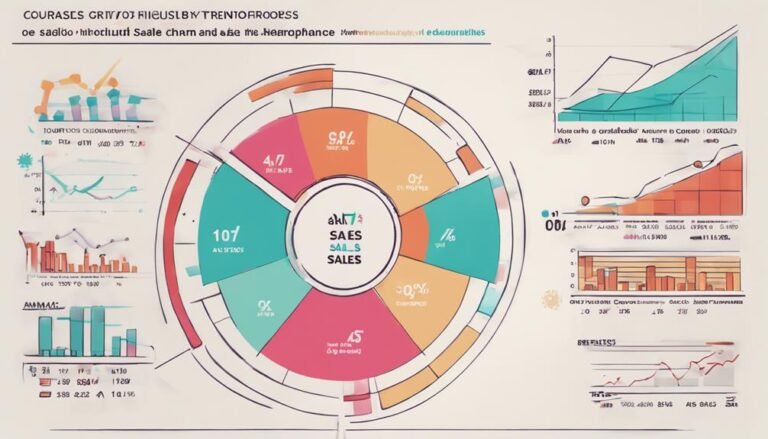How Can I Teach Soft Skills Online?
When it comes to teaching soft skills online, you may find yourself pondering the most effective ways to engage learners and foster skill development in a virtual setting. Utilizing innovative techniques and interactive platforms can be key, but what truly sets a successful online soft skills course apart lies in the careful design and execution of engaging activities that not only educate but also inspire learners to apply these skills effectively. Curious to uncover practical strategies that can elevate your online teaching approach? Let's explore together how you can cultivate a dynamic learning environment that nurtures essential soft skills in a digital landscape.
Key Takeaways
- Utilize online platforms for flexibility and convenience.
- Incorporate interactive simulations for practical skill application.
- Offer virtual role-playing scenarios for real-world practice.
- Provide constructive feedback mechanisms for improvement.
- Utilize technology for engaging and personalized learning experiences.
Understanding the Importance of Soft Skills
Understanding the importance of soft skills is essential in today's fast-paced and competitive job market, where interpersonal abilities often set individuals apart from their peers. Soft skills impact various aspects of professional success, including communication, teamwork, and problem-solving. In the domain of online learning, these skills play a vital role in fostering effective virtual collaboration and building relationships with remote colleagues.
Online learning benefits individuals by providing flexibility and convenience in acquiring these essential soft skills. Through virtual platforms, learners can enhance their communication skills by participating in online discussions, honing their teamwork abilities through group projects, and improving their time management by juggling coursework with other responsibilities. Additionally, online learning offers a diverse range of resources such as webinars, virtual workshops, and interactive modules that cater to different learning styles, making it easier for individuals to develop and practice their soft skills in a digital environment.
Embracing online learning opportunities can greatly contribute to honing these essential abilities and preparing individuals for success in today's dynamic work landscape.
Identifying Key Soft Skills to Teach
To effectively prepare individuals for success in the modern work environment, it's essential to pinpoint and prioritize the key soft skills that need to be taught. When identifying the soft skills to teach in online environments, consider the following:
- Soft Skill Assessment: Utilize tools and assessments to gauge the current soft skill levels of individuals, helping you tailor the training to their specific needs.
- Virtual Learning: Emphasize adaptability and communication skills in virtual settings, vital for remote work success.
- Online Soft Skill Training: Offer interactive modules covering leadership, teamwork, and time management to enhance overall workplace performance.
- Practical Applications: Incorporate real-world scenarios and role-playing exercises to provide hands-on experience, ensuring learners can apply the soft skills in their daily work life effectively.
Designing Engaging Online Curriculum
Craft an interactive online curriculum that captivates learners from start to finish, fostering a dynamic and immersive learning experience. To achieve this, leverage online engagement strategies that promote active participation and virtual communication techniques that simulate real-world interactions. Integrate digital storytelling into your curriculum to create a compelling narrative that keeps learners engaged and connected to the material. By incorporating elements of gamified learning experiences, such as rewards, challenges, and progress tracking, you can make the learning process more interactive and enjoyable.
Consider using multimedia elements like videos, animations, and interactive quizzes to cater to different learning styles and enhance overall engagement. Utilize discussion forums, group projects, and virtual simulations to encourage collaboration and peer-to-peer interaction. Additionally, provide opportunities for self-reflection and feedback to help learners apply soft skills in practical scenarios.
Incorporating Interactive Learning Activities
Ready to elevate your online soft skills teaching?
Get ready to immerse your learners with interactive simulation exercises and dynamic role-playing scenarios. These hands-on activities will engage your students, making the learning experience both fun and effective.
Let's explore how these interactive tools can take your online teaching to the next level!
Interactive Simulation Exercises
Engage your online learners effectively with interactive simulation exercises that bring real-world scenarios to life in your virtual classroom. Explore the following activities to enhance soft skills:
- Virtual Team Building Exercises: Foster teamwork and collaboration through virtual challenges that require group problem-solving.
- Interactive Communication Simulations: Practice effective communication in realistic scenarios to improve listening and speaking skills.
- Collaborative Problem Solving Scenarios: Encourage learners to work together to overcome obstacles, promoting critical thinking and decision-making skills.
- Engaging Empathy Building Activities: Develop empathy and emotional intelligence by immersing participants in situations that require understanding and compassion.
These interactive exercises provide a dynamic learning experience, allowing your online learners to apply soft skills in practical contexts.
Role-Playing Scenarios
Utilize role-playing scenarios as a dynamic tool to immerse online learners in interactive learning activities that enhance their soft skills effectively.
Virtual teamwork simulations can offer a hands-on approach to developing collaboration, decision-making, and conflict resolution skills in a digital environment.
Interactive communication exercises provide opportunities for practicing active listening, empathy, and clear articulation of ideas.
Online leadership scenarios enable learners to hone their decision-making, delegation, and motivational skills through realistic virtual challenges.
Digital problem-solving simulations challenge individuals to think critically, adapt to changing circumstances, and strategize solutions in a virtual setting.
Utilizing Virtual Role-Playing Exercises
Step into the virtual world and experience interactive scenarios that challenge and develop your soft skills.
Engage in role-playing activities that immerse you in real-world situations, providing practical application of the skills you're learning.
Through these exercises, you'll enhance your communication, problem-solving, and teamwork abilities in a dynamic and engaging way.
Interactive Virtual Scenarios
To enhance the effectiveness of your online soft skills training, incorporate interactive virtual scenarios that involve immersive virtual role-playing exercises. Here are four reasons why this approach can be beneficial for your learners:
- Enhanced Engagement: Virtual scenarios make learning interactive and engaging.
- Improved Communication: Practice interactive communication techniques in a safe environment.
- Virtual Team Building: Foster teamwork and collaboration among participants.
- Real-world Application: Allow learners to apply soft skills in realistic situations for better retention.
Engaging Role-Play Activities
Engage your learners in dynamic and immersive role-play activities through the utilization of virtual role-playing exercises to enhance their soft skills training experience.
Online improvisation exercises offer a unique opportunity for participants to think on their feet, adapt to different scenarios, and improve their communication skills in a virtual setting. These exercises can simulate real-world interactions, allowing learners to practice active listening, empathy, and conflict resolution in a safe environment.
Introducing virtual communication challenges can further push participants to navigate through various communication styles, work on their teamwork abilities, and foster creativity. By incorporating these engaging role-play activities into your online soft skills training, you can create a rich and interactive learning experience that promotes skill development and retention.
Real-World Skill Application
Utilizing virtual role-playing exercises enhances your ability to apply real-world skills in a dynamic and immersive online learning environment. When engaging in practical application within virtual environments, you can experience a seamless transfer of skills to real-life scenarios. Here's why virtual role-playing is effective for skill application:
- Interactive Scenarios: Engage in realistic situations to practice decision-making skills.
- Immediate Feedback: Receive instant feedback on your actions, facilitating quick learning.
- Adaptability Training: Enhance your flexibility by maneuvering through different virtual scenarios.
- Skill Retention: Improve skill retention through repeated exposure in online platforms.
Providing Constructive Feedback Mechanisms
Constructive feedback is an essential tool for fostering growth and development in online soft skills training. Providing constructive criticism in a virtual setting helps learners understand their strengths and areas needing improvement. One effective method is establishing feedback loops where learners receive consistent input on their progress.
To create an effective feedback mechanism, make sure that feedback is specific, actionable, and focused on behaviors rather than personal traits. When delivering feedback, be constructive and offer suggestions for improvement to guide learners towards success. Encourage self-reflection by prompting learners to assess their performance based on the feedback received.
Utilize various online tools such as video conferencing, messaging platforms, or discussion boards to provide timely feedback. Encourage open communication channels for learners to seek clarification or additional guidance. Remember, the goal of constructive feedback is to empower learners to enhance their soft skills continuously. By implementing robust feedback mechanisms, you can create a supportive learning environment that promotes skill development and growth.
Fostering Collaboration in Virtual Environments
Fostering collaboration in virtual environments requires intentional communication and shared goals among team members. To cultivate effective teamwork online, consider the following strategies:
- Virtual Team Building Activities: Engage in virtual icebreakers, team challenges, or online team-building games to strengthen bonds and boost morale.
- Remote Collaboration Strategies: Utilize project management tools, video conferencing platforms, and shared virtual workspaces to facilitate seamless collaboration across remote teams.
- Online Communication Skills: Encourage active listening, clear articulation of ideas, and concise written communication to enhance virtual interactions.
- Digital Teamwork Techniques: Implement structured communication protocols, establish regular check-ins, and foster a culture of trust and accountability to promote successful digital teamwork.
Leveraging Technology for Skill Development
Leveraging technology can enhance skill development by providing interactive and personalized learning experiences tailored to individual needs and preferences. Technology integration plays a vital role in creating engaging virtual learning environments that foster competency development. Through online platforms, learners can access a variety of tools such as simulations, virtual reality, and gamified applications that make skill enhancement both effective and enjoyable.
Virtual learning environments offer the flexibility to practice soft skills in real-world scenarios, receiving immediate feedback and guidance. These platforms enable learners to engage in interactive activities that mimic workplace situations, helping them develop essential skills like communication, teamwork, and problem-solving. With the aid of technology, individuals can track their progress, set goals, and access resources that target specific areas for improvement.
Assessing and Evaluating Soft Skills Online
When evaluating soft skills online, you can utilize tools like online skill assessments, virtual role-playing scenarios, and peer feedback platforms to gauge proficiency.
These methods offer interactive ways to assess communication, teamwork, and problem-solving skills in a virtual setting.
Online Skill Assessments
How can online skill assessments effectively evaluate and measure soft skills in a virtual learning environment? Here are four key points worth contemplating:
- Interactive Simulations: Utilize virtual scenarios that mimic real-life situations to assess skills like communication and problem-solving.
- Self-Assessments: Incorporate quizzes and self-evaluation tools that allow learners to reflect on their soft skills development progress.
- 360-Degree Feedback: Implement a system where peers, supervisors, and self-evaluations provide a holistic view of an individual's soft skills.
- Behavioral Assessments: Use behavioral-based questions and situational judgment tests to gauge how individuals would react in different work-related scenarios.
Virtual Role-Playing Scenarios
To effectively evaluate and measure soft skills in a virtual learning environment, consider immersing learners in virtual role-playing scenarios that mirror real-life interactions. Utilize these scenarios to enhance communication techniques and foster virtual team building.
Present learners with problem-solving scenarios that require critical thinking and decision-making skills. Through these virtual role-plays, participants can practice applying conflict resolution strategies in a safe yet realistic setting.
Encourage active participation and provide constructive feedback to help individuals refine their soft skills. By engaging in these immersive experiences, learners can develop a deeper understanding of how to navigate various interpersonal dynamics and situations, preparing them for success in both virtual and physical environments.
Peer Feedback Platforms
Consider utilizing peer feedback platforms as a dynamic tool for evaluating and appraising soft skills in an online learning environment. By incorporating peer evaluation and online coaching, you can enhance the evaluation of soft skills effectively. Here are four ways peer feedback platforms can benefit your online soft skills training:
- Enhanced Feedback: Receive virtual feedback from peers to gain diverse perspectives.
- Interactive Exercises: Engage in interactive exercises for practical skill development.
- Real-time Evaluation: Obtain real-time evaluations to track progress and areas for improvement.
- Peer Support: Foster a supportive online community for constructive criticism and encouragement.
Peer feedback platforms offer a collaborative and insightful approach to evaluating and refining soft skills in an online setting.
Cultivating a Supportive Online Learning Community
Creating a supportive online learning community is essential for fostering engagement and collaboration among participants. To build relationships and create a community in the virtual space, it's crucial to establish platforms where learners can interact, share ideas, and support each other's progress. Encouraging open communication channels, such as discussion forums or group chats, can facilitate meaningful connections and foster a sense of belonging within the online cohort.
One effective strategy is to assign group projects or activities that require teamwork and peer feedback. By working together towards a common goal, participants can learn from each other, develop empathy, and enhance their communication skills. Additionally, incorporating icebreaker activities or virtual social events can help break the ice and create a more relaxed atmosphere for students to engage with one another.
Conclusion
As you navigate the digital landscape of teaching soft skills online, remember that you're the captain of a ship setting sail through uncharted waters. Your role is to steer learners towards success by equipping them with the necessary tools and strategies to navigate through challenges and reach their destination.
With innovation as your compass and collaboration as your crew, you can plot a course towards a brighter future where soft skills are the wind in your sails. Begin this journey with confidence and determination, knowing that the skills you impart will guide learners towards success in the ever-evolving job market.







